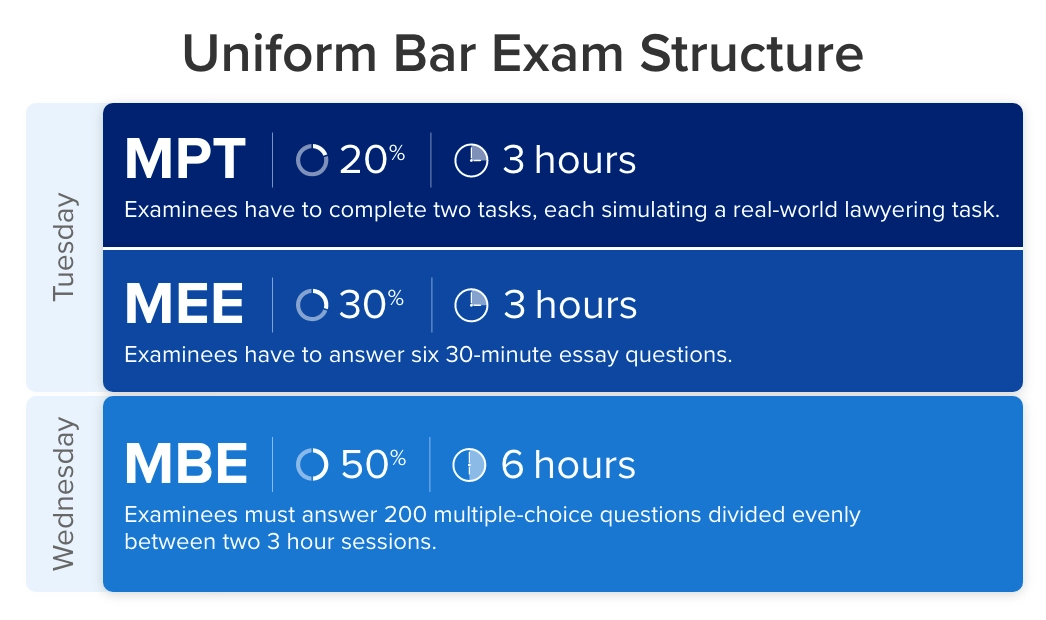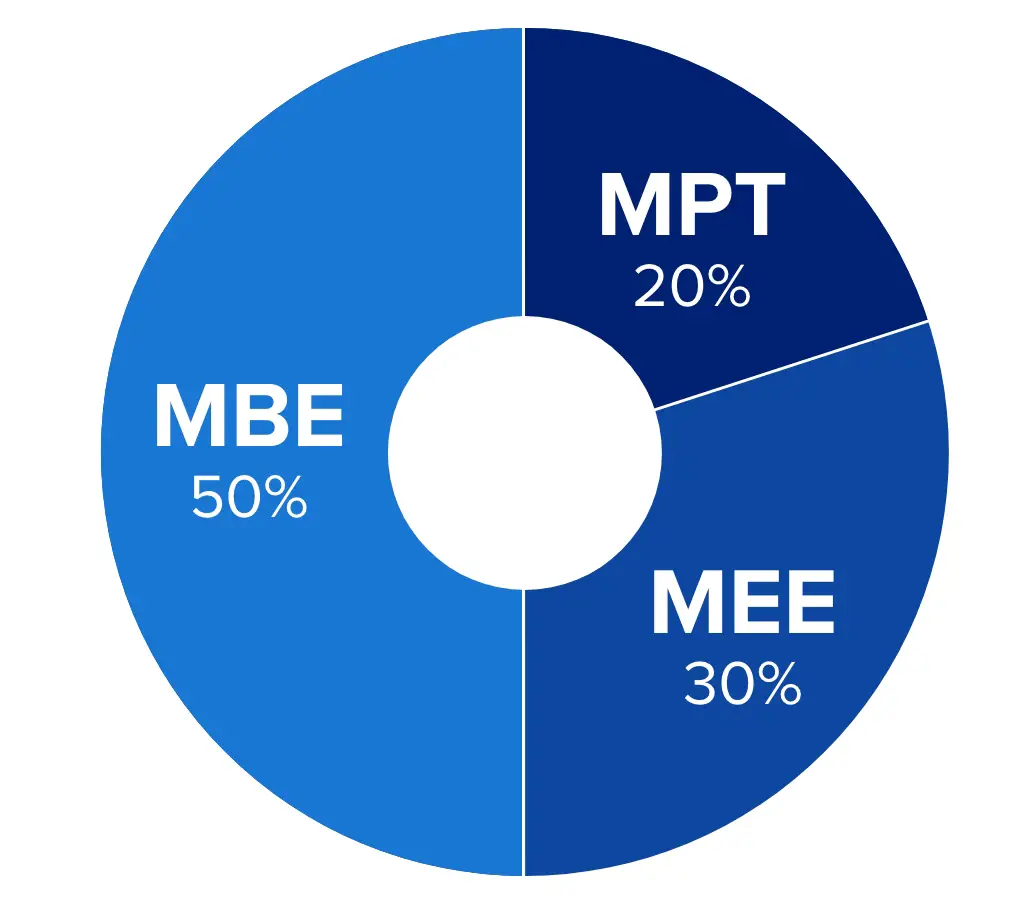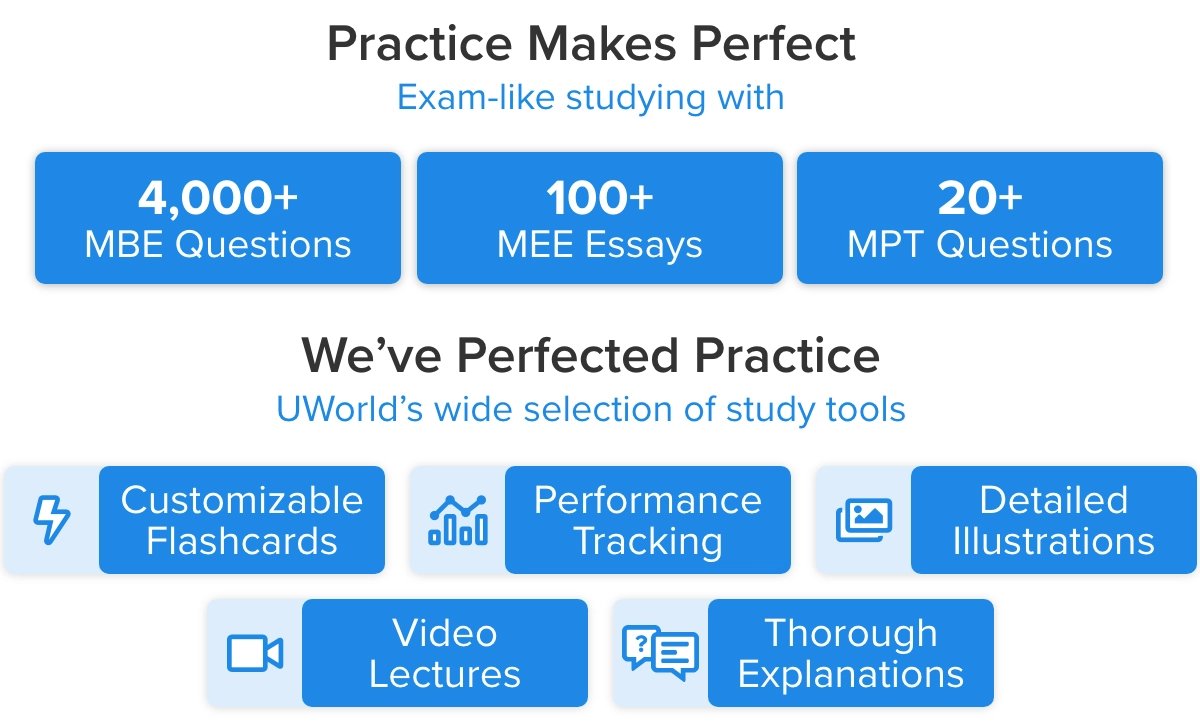The Arizona Bar Exam 2024
Structure, Topics, Dates, Cost, Scores, and Eligibility
The Arizona Bar Exam adopted the Uniform Bar Examination (UBE®) format in July 2012. The exam is administered through the Admissions Unit of the Certification and Licensing Division of the Supreme Court of Arizona. It is divided into three sections—the Multistate Bar Examination (MBE®), the Multistate Performance Test (MPT®), and the Multistate Essay Examination (MEE®).
Bar candidates that may want to eventually practice law in another state benefit from score portability between the 41 jurisdictions that have adopted the UBE. This article provides everything you need regarding AZ Bar Exam results, dates, deadlines, fees, applications, and more.
Arizona Bar Exam Structure
The Uniform Bar Exam is administered over two days and consists of a writing section (MPT/MEE) and a multiple-choice section (MBE).

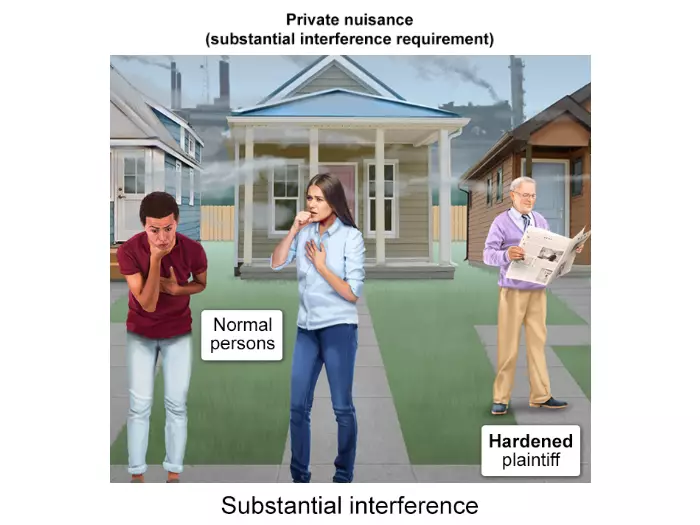
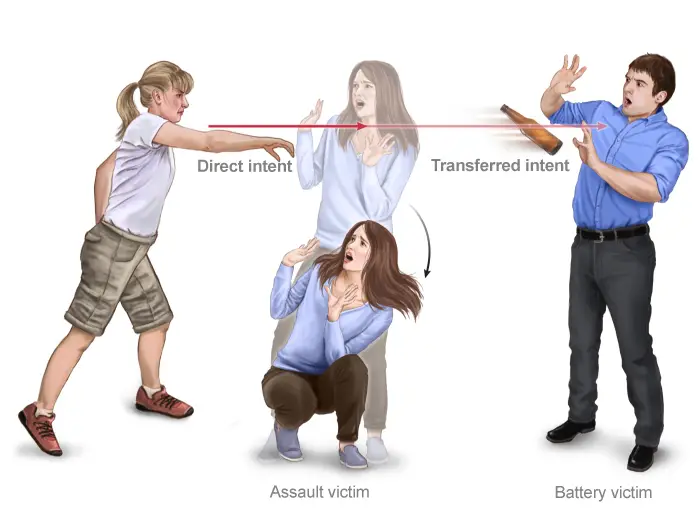

Arizona Bar Exam Dates, Requirements, and Scheduling
Avoid the $100 late fee by submitting your application before the first filing deadline, and be sure to review the important deadlines, dates, and fees below.
Exam Dates
2024 Application Deadlines:
| Filing Periods | February 27-28, 2024 Exam |
July 30-31, 2024 Exam |
|---|---|---|
| Application Opens | August 15, 2023 | January 15, 2024 |
| First Filing Deadline | October 31, 2023 | March 31, 2024 |
| Final Filing Deadline | November 30, 2023 | April 30, 2024 |
Applicants who sat for the Arizona Bar Exam may reapply for the exam immediately following their original administration. Filing deadlines are shown below.
2023 Reapplication Deadlines:
| Filing Periods | February 27-28, 2024 Exam |
July 30-31, 2024 Exam |
|---|---|---|
| Reapplication Opens | 2nd Friday of October | 2nd Friday of May |
| Timely Filing Deadline | November 1, 2024 | June 1, 2025 |
| Late Filing Deadline | November 30, 2024 | June 30, 2025 |
Like other jurisdictions, The Arizona Supreme Court requires that bar applicants undergo a $300 character and fitness investigation. The investigation typically takes a minimum of four months, followed by an assessment by The Committee on Character and Fitness. There is no precise time for processing your application, but it must be completed before you can be admitted to the Arizona Bar.
Requirements
To take the Arizona Bar Exam, you must have graduated with a Juris Doctorate (JD) from a law school approved by the American Bar Association (ABA). Candidates that have not earned a JD from an ABA-accredited law school must have been actively engaged in the practice of law in the US for three of the five years preceding the filing of an application for admission by examination.
Scheduling
Before you can file an application with the Arizona Bar Operations and Admissions, you must create an account on the Arizona Supreme Court Attorney Admissions website. To create an account, you must have a National Conference of Bar Examiners (NCBE®) number, which you can get by registering with the NCBE.
Prepare these required documents for your application:
- Declaration
- Authorization and Release
- Code of Conduct
You must also produce evidence of your JD from an ABA-accredited law school in one of the following forms:
- Photocopy of diploma showing name, date, and degree
- Original verified transcript indicating date JD conferred, or
- Original and currently dated letter of your law school attesting to date JD conferred
You'll also need a 2 x 2 (minimum) to 2.5 x 2.5 (maximum) passport-style photo of yourself with the last four digits of your social security number written on the back, a completed fingerprint card requested from the Committee on Character and Fitness, proof of citizenships, and a certificate of good standing if you've been admitted to practice law in another jurisdiction. All the original documents must be physically mailed to Arizona Bar Committee on Examination.

Arizona Bar Exam Cost and Fees
Fees and costs associated with the Arizona Bar Exam vary depending on status and filing date. Below is a detailed and up-to-date list of exam-related fees.
| Application Fees | |
| Timely Filing | $580 |
| Late Filing | $680 |
| Other Application Fees | |
| Character Report | $300 |
| Supplemental Character Report | $125* |
| Admission by Motion | $1800 |
| UBE Score Transfer (General) | $675 |
| Late Fees | |
| General Applicant (total) | $885 |
| Attorney Applicant (total) | $920 |
| Miscellaneous Fees | |
| Printed Applications | $20 |
| Copy of Character Report | $20 |
| MBE Hand Scoring | $25 |
| Partial Refund of Fees | $50 |
| Laptop Use Fee | $125 |
| Foreign Legal Consultant Application Fee | $525 |
Payment Policies
Applicants must submit fees with all required documents. Here are some important policies to note:
- Fees will not be accepted after the late filing deadline
- The Arizona Supreme Court does not waive fees for those with financial hardships
- Laptop registration fees are paid to the software vendor, not the Supreme Court.
Exams are closed out, meaning that your payment for one exam cannot roll over to the next. However, you can withdraw a partial refund of $50 by submitting a signed, physical letter by April 30 or November 30 for the July or February exam, respectively.
Cost-Saving Options
Sitting for the Arizona Bar Exam is not cheap, and Arizona does not offer help for those enduring financial hardship. However, there are financial aid and scholarship options available.
- James E. Rogers College of Law — Offers financial aid and scholarships based on merit and performance. If you're a University of Arizona student, you can try out Scholarship Universe, a scholarship matching tool.
- Native American Bar Association of Arizona — Offers the "Seven Generations Scholarship" to students recognized by any Native community as being Native American.
Additionally, The James E. Roger College of Law hosts a helpful list of Law College Association Scholarships and Student Award Funds.
Arizona Bar Exam Subjects and Topics
The AZ bar exam tests an examinee's ability to analyze and reason alongside their knowledge and understanding of fundamental legal principles. Furthermore, since Arizona has adopted the UBE, a successful exam score represents one's competency and readiness to practice law in the 40 other participating jurisdictions.
MBE
The MBE is administered in two 3-hour sessions on Wednesday (Day 2) of the bar exam. It is scored on a 200-point scale and presents candidates with 200 multiple-choice questions. Remember there are 25 unscored pilot questions for future exams, the remaining 175 questions are divided evenly among the following seven MBE subjects:
- Constitutional Law
- Contracts
- Criminal Law/Procedure
- Evidence
- Civil Procedure
- Real Property
- Torts
MEE
The MEE consists of six essay questions. Each question involves one or more of the subjects listed below. Some subjects may be paired together. Other subjects could be omitted. While it's impossible to know which subjects the NCBE will choose on any given exam version, some have been tested more frequently than others historically.
For example, Civil Procedure has appeared on nearly every MEE in the past decade, while Criminal Law has only appeared several times. However, subjects that occur less frequently on their own may be paired with others.
- Business Associations
- Civil Procedure
- Conflict of Laws
- Constitutional Law
- Contracts
- Criminal Law and Procedure
- Evidence
- Family Law
- Real Property
- Secured Transactions
- Torts
- Trusts and Estates
Check out our MEE Subject Matter Outline for detailed explanations of MEE subjects and sub-topics.
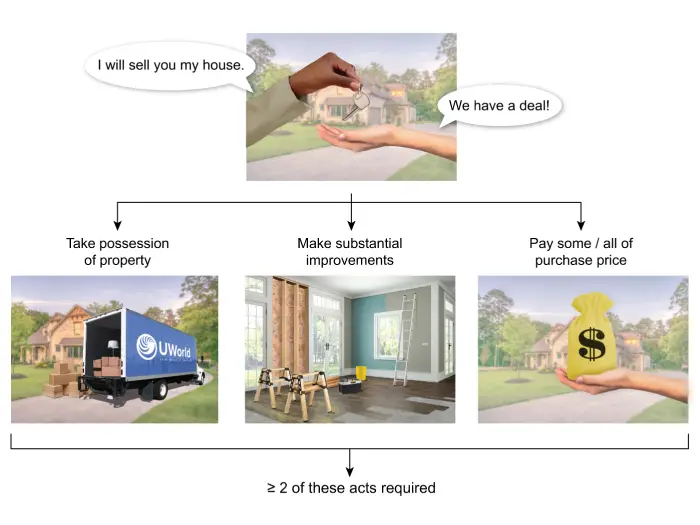
MPT
The Multistate Performance Test consists of closed-universe practical questions with instructions, factual data, cases, statutes, and other reference material supplied by examiners. Candidates will answer two cases presenting simulated real-life scenarios to demonstrate their lawyering skills, using only the materials provided by the bar examiners. Each case is assessed on a 6-point scale, with a 6 being the highest possible score and a 0 the lowest possible score.
Arizona Bar Exam Scoring/Grading
To be admitted into the Arizona Bar, applicants must pass the UBE with a minimum scaled score of 270 out of 400. Exam weightage is divided between the three sections as follows:
The MEE and MPT are combined into half the weightage of the test and graded as such. Therefore, the writing section (MEE/MPT) and the multiple-choice section (MBE) each comprise 50%, or 200 points, of your total scaled score. If you do poorly on one section of the exam, you can make up for it on the other, as long as these scores combine to a sum of 273 or more.
Note that getting 136.5 of 200 MPT questions correct does not necessarily mean you've earned 136.5 scaled points. Scaled scoring is employed to ensure fairness across exam versions. This scoring model is true for all three sections of the bar exam.
For example, July's exam may be more difficult than February's. It would be unfair to allow someone to pass or fail based on the relative difficulty of their exam version. Therefore, examinees' raw scores are transformed into scaled scores through a statistical method called equating. Unfortunately, the NCBE does not release data on the calculations it uses to determine scaled scores.
Arizona MPRE Minimum Passing Score
Multistate Professional Responsibility Examination (MPRE®) features 60 multiple-choice questions administered over two hours. You must also pass the MPRE with a minimum score of 85 before you can practice law in Arizona.
Arizona Bar Exam Results and Pass Rates
As is typical with bar exams across the country, the Arizona Bar Exam's repeater pass rate is markedly lower than the first-timer pass rate. This phenomenon is likely because many examinees who failed the first time haven't changed their study habits significantly.
| Exam | Overall Pass Rate |
First-Timer Pass Rate |
Repeater Pass Rate |
Results Release Date |
|---|---|---|---|---|
| July 2023 | 68% | 78% | 31% | October 26 |
| Feb. 2023 | 41% | 60% | 12% | May 12 |
Below are the annual pass rates for the Arizona Bar Exam since 2017 divided into first-time examinees and repeaters:
| Exam | First Timers | Repeaters | Overall | |||
|---|---|---|---|---|---|---|
| Year | No. Of Candidates |
Pass Rate | No. Of Candidates |
Pass Rate | No. Of Candidates |
Pass Rate |
| 2022 | 533 | 70% | 190 | 21% | 723 | 57% |
| 2021 | 566 | 77% | 220 | 25% | 786 | 62% |
| 2020 | 608 | 76% | 241 | 27% | 849 | 62% |
| 2019 | 559 | 74% | 269 | 27% | 828 | 58% |
| 2018 | 616 | 69% | 345 | 22% | 961 | 53% |
| 2017 | 624 | 64% | 347 | 25% | 971 | 50% |
Arizona Bar Exam Results
Results are released on the 2nd Friday in May and October for the February and July exams, respectively.
Arizona Bar Exam Reciprocity
It is possible to be admitted to the Arizona Bar without sitting for the Arizona Bar Exam: apply for admission on motion or transfer your UBE score. This process is much easier if you are transferring from a jurisdiction that has reciprocity with Arizona. Arizona has reciprocity with the following jurisdictions:
| Alaska | Michigan | Oklahoma |
| Colorado | Minnesota | Oregon |
| District of Columbia | Mississippi | Pennsylvania |
| Georgia | Missouri | South Dakota |
| Idaho | Montana | Tennessee |
| Illinois | Nebraska | Texas |
| Indiana | New Hampshire | Utah |
| Iowa | New Jersey | Vermont |
| Kansas | New Mexico | Virginia |
| Kentucky | New York | Washington |
| Maine | North Carolina | Wisconsin |
| Massachusetts | North Dakota | Wyoming |
| Maryland | Ohio |
Admission on motion
Admission on motion is a process through which attorneys in one US jurisdiction can secure admission to the bar of another jurisdiction without having to take that jurisdiction's exam. Arizona requires that candidates for admission on motion meet the following requirements:
- Earned a JD from an ABA-accredited law school
- Engaged in the "active practice" of law for three of the five years preceding application
- Deemed to be of moral fitness
- Earned, or will earn, 85 or higher on the MPRE
- Admitted by examination to a reciprocal jurisdiction
Candidates who were admitted to the bar in a non-reciprocal jurisdiction can apply for admission on motion if they meet the criteria for "active practice."
UBE transfer
Arizona recognizes UBE scores from participating jurisdictions. However, the minimum passing score for the Arizona Bar Exam is relatively high. To qualify for UBE score transfer, you must meet the following requirements:
- Earned a JD from an ABA-accredited law school
- Passed the UBE in a participating jurisdiction
- Achieve a UBE score of 273 or higher
UBE transfer applicants still must undergo a background investigation and complete the Course on Arizona Law before they are admitted to practice law in the state.
What Makes the Arizona Bar Exam Unique?
The Arizona Bar exam has a relatively high minimum passing score of 273. Furthermore, The Arizona Supreme Court requires candidates to take the Arizona Law Course, which highlights Arizona-specific laws, especially those regarding:
- Civil Procedure
- Torts
- Contracts
- Criminal Procedure
- Family Law
- Real Property
- Professional Responsibility
- Constitutional Law
The course contains six hours of video along with supplemental materials and “knowledge checks”. You can register for the course with the Arizona Judicial Branch.
Arizona Bar Exam for Foreigners
Individuals who have graduated from a foreign law school or have obtained an LL.M. or other graduate law degree from an ABA-accredited law school cannot sit for the Arizona Bar Exam on that basis alone. However, they can be issued a certificate of registration as a foreign legal consulate if they meet the following requirements:
- Have Been admitted to practice and have been in good standing for five years preceding the application date
- Have actively practiced law for three of the five years preceding the application date
- Possess good moral character
- Intend to practice law and maintain an office in Arizona
- Possess documented proof that you have complied with US immigration law
To sit for the Arizona Bar Exam, foreigners can earn a JD if they are attending a non-US law school approved by the government or accrediting authority in the nation of the law school.
Final Takeaways
The difference between those who fail the Arizona Bar Examination and those who pass is the right study plan. A quality full bar review course will help improve your score, whether it's your first, second, or even third time taking the AZ Bar Exam.
Themis + UWorld gets you exam-ready with exam-like practice with content and questions curated by an in-house team of subject matter experts. Our in-depth answer explanations for each answer choice and industry-leading images make the hard stuff easy to understand. Here's an overview of what you'll get:
Contact Details of the Arizona State Bar
The Ohio Supreme Court answers calls Monday through Friday from 8:30 am to 5:00 pm, except for state and federal holidays.
| Arizona Board of Bar Examiners Contact Information | |
|---|---|
| Medium | Info |
| Phone Number | 602-452-3971 |
| Hearing Impaired (Text) | 602-452-3545 |
| [email protected] | |
| Address | Supreme Court of Arizona Administrative Office of the Courts 1501 W. Washington, Suite 104, Phoenix, AZ 85007-3222 |

